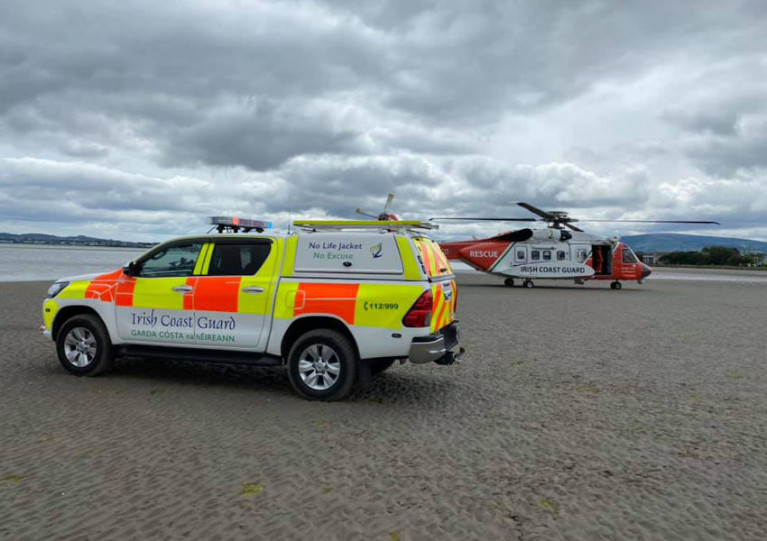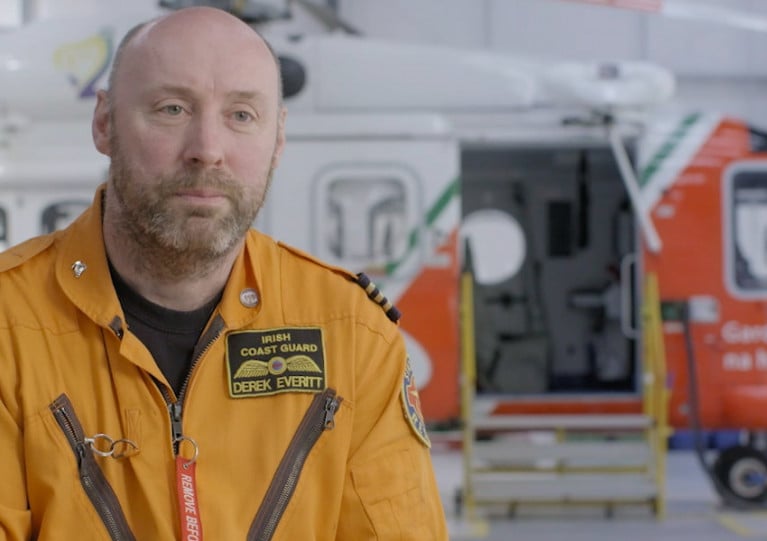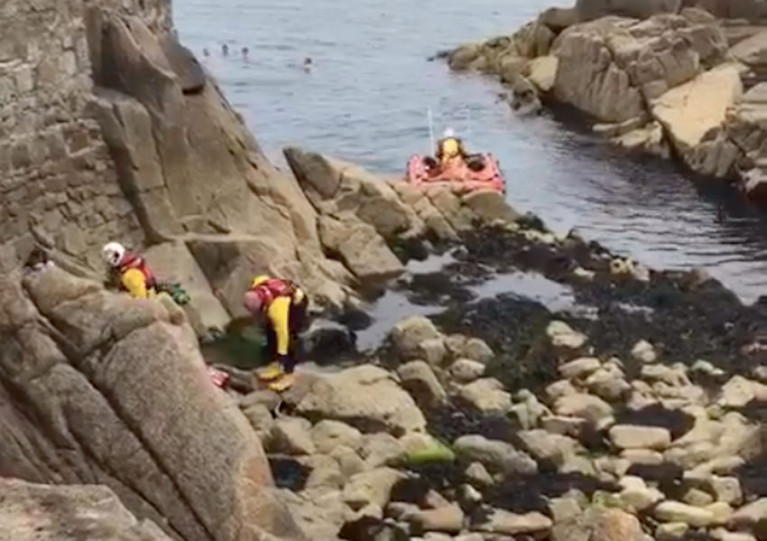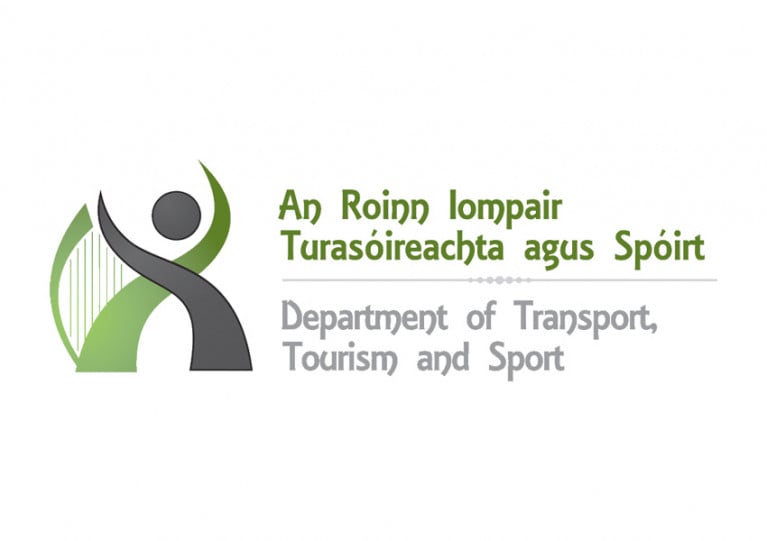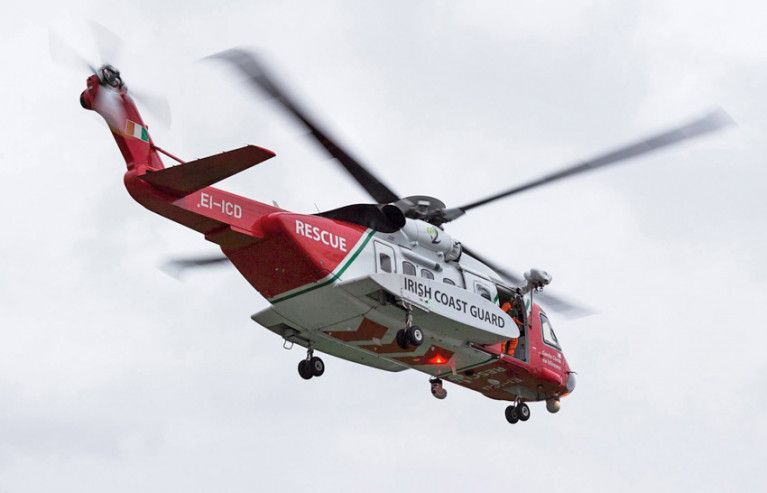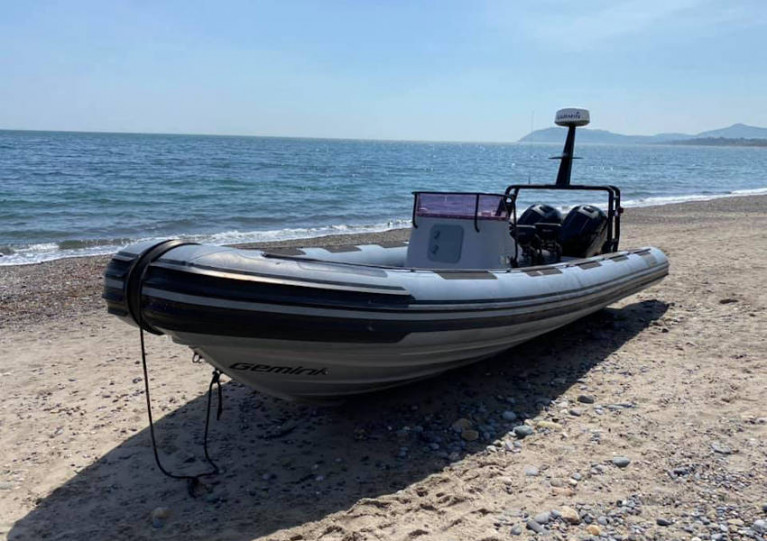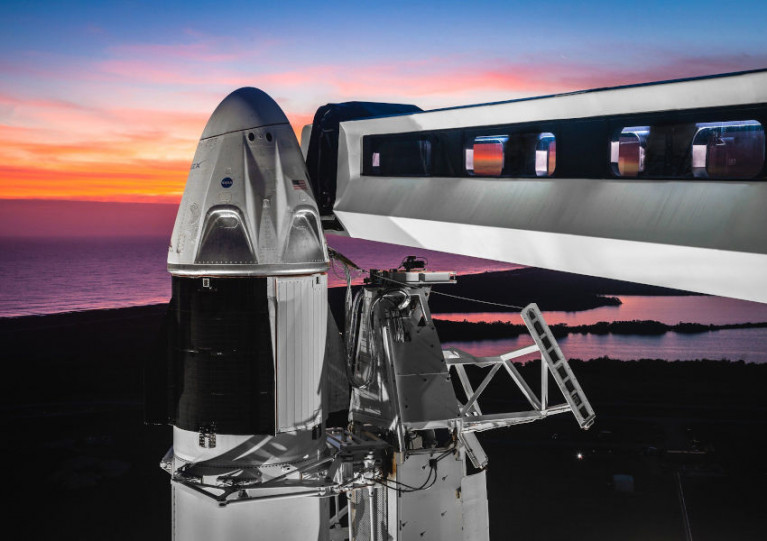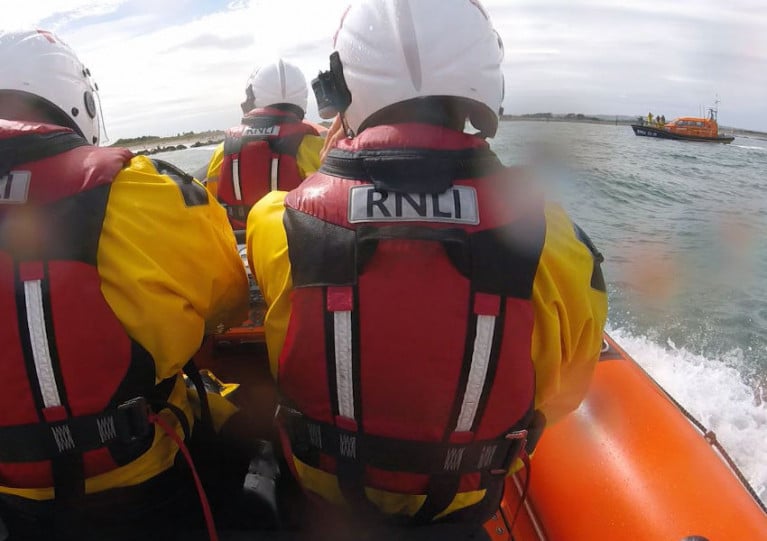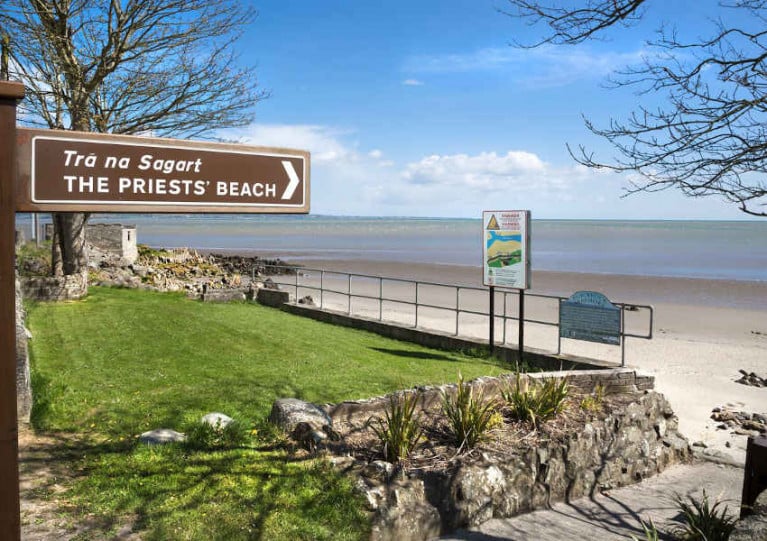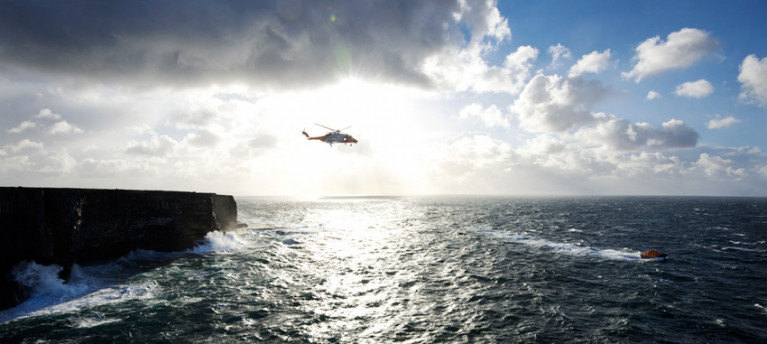Displaying items by tag: Irish Coast Guard
The Irish Coast Guard’s Dun Laoghaire unit launched to the rescue of a family of four cut off by the tide on Sandymount yesterday afternoon, Saturday 25 July.
Dun Laoghaire Coast Guard were tasked to incident along with the local RNLI’s inshore lifeboat and the Dublin-based coastguard helicopter Rescue 116.
The two adults and two children were retrieved from their sandbank by the helicopter crew, who landed them at a safe spot on land where they wiremen by a coastguard team. All were found to be in good spirts.
Emergency services remind the public if you see anyone in difficulty in or near the water to dial 112/999 immediately and ask for the coastguard.
Vertical Magazine has shared video of a roundtable discussion on helicopter rescues from earlier this year, featuring a member of the Rescue 116 crew with the Irish Coast Guard.
Helicopter winchman Derek Everitt was in attendance at the HAI Heli-Expo in Anaheim, California this past January, where he took part in a talk with fellow professionals about their ‘life on the wire’.
He was joined by Montana-based air rescue specialist Wil Milam, fire rescue pilot Tony Webber, Canadian rescuer Rob Munday, Las Vegas police flight instructor Dave Callen and hoist operator and paramedic Jason Connell.
The wide-ranging discussion, which can be seen in the video above, included their most memorable rescues — and some of the biggest mistakes they’ve learned from.
For Everitt, his most memorable “screw-up” was as young crewman with the Air Corps involved an unplanned landing at a mountain crossroads for his pilot to impress a high-ranking friend — with embarrassing results.
Vertical has much more on the story HERE.
Faller At Forty Foot Is Stretchered To Safety
Dun Laoghaire’s coastguard unit was tasked yesterday (Sunday 12 July) to assist paramedics with a casualty who had fallen down steps at the Forty Foot bathing spot.
Dun Laoghaire RNLI’s inshore lifeboat was also in attendance at the scene, where local lifeguards in Sandycove treated the casualty before the arrival of emergency services.
Dun Laoghaire Coast Guard says the patient was stabilised and stretchered to an awaiting ambulance for further care.
National Maritime Pollution Contingency Plan Is Published
The new National Maritime Oil & HNS Spill Contingency Plan (NMOSCP) will establish “a national framework and strategy to co-ordinate marine pollution preparedness and response”, according to the Department of Transport, Tourism and Sport.
Published yesterday (Friday 26 June), the plan aims to address all oil and HNS (hazardous and noxious substances) pollution in the waters of Ireland’s Exclusive Economic Zone, whether it originates from ships, harbours, offshore units, oil/HNS handling facilities or land-based sources.
An “essential feature” of the plan is co-ordination between the Irish Coast Guard and relevant Government and non-State bodies, and it provides “a platform to co-ordinate responses in the context of the Major Emergency Management Framework and separately under the Strategic Emergency Management National Structures and Framework”.
The department adds that the NMOSCP “will address Ireland’s obligation under international convention in respect to preparedness and response to maritime pollution incidents”, and will provide the coastguard with a benchmark for best international practice.
The contingency plan is available to download below, while various standard operating procedures can be found on gov.ie HERE.
The Irish Times reports that a 35-year-old man was airlifted to hospital with serious spinal injuries after a diving incident in Co Cork yesterday afternoon (Monday 1 June).
It’s understood that the man was diving from rocks near Nohoval Cove, between Kinsale and Crosshaven, when his foot caught and he landed on rocks.
Kinsale RNLI and gardaí attended the scene along with the Irish Coast Guard, which airlifted the casualty on board the Shannon-based Rescue 115 helicopter to Cork University Hospital.
Elsewhere, the search resumed this morning for a five-year-old boy believed to have fallen from a dinghy on Lough Mask.
RTÉ News reports that gardaí and the coastguard are searching the west side of the lough near Toormakeady in Co Mayo.
On the same day that Dun Laoghaire Coast Guard assisted the local RNLI in aiding a boat in distress in Dublin Bay, the crew were also takes to investigate a mystery RIB on Killiney Beach.
It was quickly confirmed with locals, however, that the vessel had been beached the previous evening (Wednesday 27 May) and that the owner was aware and planned to reflect it at high tide.
More recently (Friday 29 May) Dun Laoghaire Coast Guard was tasked to get eyes on a jet ski reportedly broken down and adrift in Scotsman’s Bay.
A team was despatched to the area with RNLI Dun Laoghaire already en route. On arrival, the jet ski was located with the casualties taken aboard the RNLI offshore boat and the jet ski towed back to Dun Laoghaire Harbour to awaiting coastguard members.
With warm and sunny weather set to continue throughout the June Bank Holiday weekend, the coastguard appeals to the public to adhere to the safety advice and act responsibly in or near the water.
Seapoint, Sandycove and Killiney beach within the Dun Laoghaire-Rathdown County Council area now have active lifeguards in place which the coastguard welcomes.
“With the weather staying warm and dry over the Bank Holiday this weekend, we remind everyone to keep within your 5km distance from home, keep two metres from others and dial 112 or use VHF Channel 16 if someone is in difficulty in or near water.”
The Irish Coast Guard was on standby for last night’s planned SpaceX launch, which was scrubbed at the final hour due to poor weather conditions.
The Falcon 9 rocket had been due to lift off from Kennedy Space Centre in Florida last night (Wednesday 27 May) with the first US launch of American astronauts in nine years to the International Space Station.
And with the flight path taking taking the SpaceX mission — the first with humans on a commercial spacecraft — around the Atlantic and just past Ireland, the coastguard here was ready to respond if the mission were aborted off Irish shores. The Irish Examiner has much more HERE.
At 21:30 the first launch of humans aboard a commercial spacecraft to the ISS will take place & the Irish Coast Guard is playing a very small part.
— Irish Coast Guard (@IrishCoastGuard) May 27, 2020
CG staff are on standby to lead the SAR operations for the @SpaceX space craft should it be forced to abort the mission. pic.twitter.com/fSTtmUEsZa
While the closing weather window put paid to last night’s launch with minutes to go, it’s possible NASA and SpaceX will try again this Saturday evening 30 May — and it’s expected the Irish Coast Guard will remain just as vigilant.
RNLI lifeboat crews from Skerries and Clogherhead launched yesterday (Monday 25 May) to retrieve a number of adults and children who had become stranded on rocks near Mornington Beach, east of Drogheda.
The lifeboats were launched shortly before 3pm after Dublin Coast Guard received emergency calls about the group’s welfare.
Also tasked were the Irish Coast Guard’s Dublin-based helicopter Rescue 116, the Drogheda Coast Guard boat, and a coastguard land unit, with all arriving on scene within minutes.
Two women, a man and three children were located on the breakwater on the Mornington side of the River Boyne. It’s understood that the women and children had managed to climb up onto the rocks after they were pulled out to sea by a strong current, and the man had come to their assistance.
Working together, Skerries RNLI and Drogheda Coast Guard used their inshore boats to transfer the woman and one of the children to Clogherhead’s all-weather lifeboat for a possible transfer to the helicopter.
However, after consultation with the woman and Rescue 116, it was decided to bring them to a waiting ambulance on Mornington pier to be assessed and treated for their injuries.
The two inshore boats then recovered the remaining casualties from the rocks and brought them to be checked out by ambulance paramedics.
Subsequently the lifeboat crew were informed that another child had also been in the water and had suffered cuts and bruises.
However, they had made it back to shore with assistance from one of the adults. That child was picked up from the beach with another adult and brought for assessment by the ambulance crews.
Speaking about the call out, volunteer lifeboat press officer for Skerries RNLI, Gerry Canning, said: “Any incident involving multiple casualties has the potential to be serious.
“This was another great example of how well our volunteers work alongside our colleagues from our flank stations, from the coastguard and indeed all the emergency services.
“We hope all the casualties involved make a full and speedy recovery.”
Two Rescued After Incident At Co Louth Beach
The Irish Mirror reports that two people were rescued from a beach in Co Louth on Saturday afternoon (23 May) after getting into difficulty in the water.
Clogherhead RNLI and the Irish Coast Guard were tasked to the scene at Priests’ Beach in Blackrock, south of Dundalk,
And it’s understood the two individuals, who were surfers, were airlifted to hospital in Drogheda for treatment by the Dublin-based coastguard helicopter Rescue 116.
Reminder: Irish Coast Guard Recruiting For Watch Officers
The closing date to apply for the role of Watch Officer with the Irish Coast Guard is this coming Thursday 30 April.
Afloat.ie previously reported on vacancies at the coastguard’s three Marine Rescue Coordination Centres in Dublin, Malin Head in Co Donegal, and Valentia in Co Kerry.
Watch Officers are responsible for watch-keeping on the emergency frequencies and are required to act as Marine Alert, Notification and/or Search and Rescue Mission Co-ordination Officers.
They also process marine communication traffic and respond to ship casualty, pollution incidents, vessel traffic monitoring and co-ordination of coastguard helicopter operations.
Full details of the Watch Officer role and how to apply can be found HERE.



























